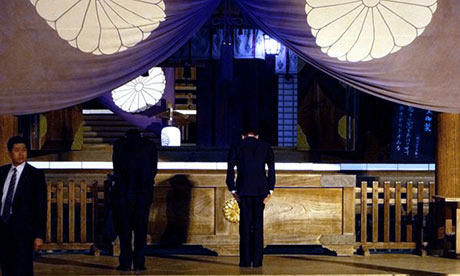Japan shrine visit angers South Korea
Seoul cancels visit by foreign minister after Taro Aso, deputy prime minister under Shinzo Abe, leads trip to war memorial

Taro Aso, Japan's deputy prime minister and finance minister, bows at the Yasukuni shrine in Tokyo. Photograph: AFP/Getty
South Korea has abruptly cancelled a trip to Tokyo by its foreign minister in protest at visits to a controversial war shrine over the weekend by Japanese cabinet ministers, including the deputy prime minister.
Visits to the Yasukuni shrine – which honours 14 class-A war criminals among 2.5 million other Japanese war dead – have traditionally angered China and South Korea, which view the site as a symbol of Japanese militarism.
Four ministers in the conservative administration of Shinzo Abe paid visits to the shrine, including his finance minister, Taro Aso.
The separate visits, to mark the beginning of the shrine's annual spring festival, come amid tensions with China over a longstanding territorial dispute in the East China sea.
Beijing did not immediately respond but South Korea said on Monday that its foreign minister, Yun Byung-se, would not be making a two-day visit to Tokyo due to begin this Friday.
"Amid this kind of atmosphere our stance is that it will be difficult to hold a productive discussion and Yun decided not to visit to Japan this time," an unnamed South Korean official told the Yonhap news agency.
Abe did not visit the shrine but sent a decorative branch of a cypress tree as a ritual offering, with his name and title written beneath, according to media reports.
China is unlikely to overlook the visit while the two rivals continue to stake rival claims to the Senkaku islands, known as the Diaoyu in China.
For many in China and South Korea, visits to Yasukuni in central Tokyo are proof that Japan's modern leaders have yet to atone for their country's military misadventures on the Asian mainland in the first half of the 20th century.
Despite his nationalist leanings Abe did not visit during his previous year-long premiership from 2006 to avoid inflaming opinion in Beijing and Seoul.
He later said he regretted the decision and with his popularity ratings high at home speculation is mounting that he may be less willing to consider sensibilities in China and South Korea, particularly if his party wins key upper house elections in July, giving it control of both Diet chambers.
Aso, who also serves as deputy prime minister, has a reputation for angering Japan's neighbours; in 2003, he praised the country's 1910-1945 colonisation of the Korean peninsula and has refused to apologise for his family firm's past use of Korean forced labourers and allied prisoners of war.
Aso, a former prime minister, wants class-A war criminals "delisted" from Yasukuni, thereby removing the biggest obstacle to members of the imperial family resuming their annual visits.
On Sunday, he bowed in the Shinto shrine's worship hall and left without speaking to reporters.The other visitors included Keiji Furuya, a state minister in charge of resolving the abduction of Japanese nationals by North Korea during the cold war. "It is natural for a lawmaker to offer heartfelt condolences for spirits of the war dead who sacrificed their lives for the nation," he said.
Abe visited the shrine in 2012 while leader of the then main opposition Liberal Democratic party, drawing criticism from China.
In late March, the Chinese foreign ministry spokesman Hong Lei said the objections over Yasukuni centred on a desire for Japan to "face up to and reflect on its history of aggression and respect the feelings of people from the victimised countries, including China".
No comments:
Post a Comment